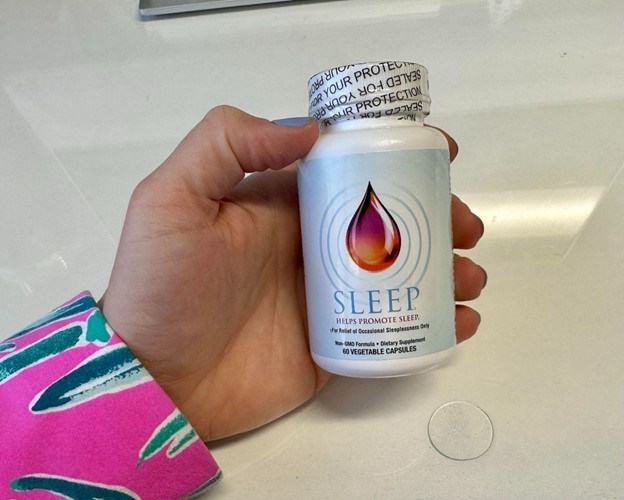70% of American adults report that they don’t get enough sleep at least one night per month (I can’t believe there are people out there sleeping every night in a month!). Many more likely don’t know how much sleep they’re supposed to get or even realize they are sleeping poorly. When everyone has a busy and high-stress lifestyle, getting enough rest just isn’t a priority.
We all know that poor sleep makes us not feel great, but it does actually result in serious physical and mental health problems. It can lead to depression, anxiety, high blood pressure, and even weight gain. Even so, people just aren’t making time to get a full night of sleep. I think it has to do a little with our culture but also the fact that the problems don’t seem to show up right away. I recently had a sleep study done myself and there were periods I was not breathing for over 40 seconds at a time! I can’t imagine holding my breath that long during the day!
We’re here to talk about the connection between sleep and weight loss (as well as sleep and weight gain). Read on to learn more.
How Can a Lack of Sleep Cause Weight Gain?
There are several ways that poor sleep can influence weight gain. Some of them are within your control and others are not.
First, consider what you do when you’re feeling sleepy during the day. To wake yourself up, do you ever have an extra latte? Do you reach for some sugary or salty snacks? When you don’t get enough sleep, you’re going to look for anything that can give you more energy. While some people turn to caffeine pills or black coffee, most will reach for something a little more calorie-dense. Calories are what our body uses as energy, and your body needing energy can lead to you grabbing that gas station cupcake.
When you don’t get enough sleep, your body doesn’t produce enough leptin. Leptin is a hormone that regulates your eating habits. It’s what tells your body when you are full and don’t need to consume any more food to sustain yourself. In other words, when you’re not sleeping enough, you’re naturally going to be hungrier. Your body isn’t receiving the signal that you’ve eaten enough calories.
Another factor is exercise and overall activity level. If you haven’t been getting enough sleep, it’s likely that you’ve been moving less. When you’re fatigued, you’re not going to want to go to the gym (and if you do, your performance probably isn’t the greatest). Even just getting up from your chair every 30 minutes or so can help.
Think of a “good day” vs a “bad day,” what would you want to reach for?
Lack of Sleep, Weight Gain, and Cortisol
Research suggests that inadequate sleep can cause your cortisol levels to spike. This effect can last through the following day, and because high cortisol can also cause sleeplessness, the problem becomes cyclical.
Cortisol is a stress hormone. Cortisol can increase your appetite and cause your body to hang onto fat (which would be important in survival situations). If you think about being “stressed” a few hundred years ago, it would be super helpful to store body fat during a famine. Unfortunately now, storing that extra body fat is hurting us! When it comes to a lack of sleep and belly fat, cortisol is likely a key factor.
Can Sleep Help With Weight Loss?
Getting enough sleep should be a primary focus when you’re trying to lose weight. Yes, a healthy diet and exercise program will also be important, but if you’re not getting enough sleep, you can undo your hard work.
When you get enough sleep, you’ll have the energy to cook healthy meals and stay more active. You’ll likely even take more steps throughout the day even if you don’t have an exercise plan.
You’ll have normal levels of leptin so you’ll feel less inclined to overeat. You’ll also be better at making smart food decisions instead of reaching for a processed (calorie-dense) snack.
Poor sleep puts your body in survival mode (that fat-storing hormone!). When you get enough sleep, you can allocate energy to weight loss.
How to Get More Sleep
Sure, you know that you have to get more sleep, but how can you make that a reality? Many of us lay awake at night unable to sleep, and others simply don’t feel as though they have the time. Here are a few things that you can do to improve your sleep while you’re getting treatment at Ascend.
Make a Sleep Schedule
This might seem silly, but it’s time to start actually scheduling sleep just as you would work or school. Give yourself a set bedtime and wake-up time and stick to it. My iPhone even gives me a buzz now that says it is time to start winding down, bedtime is soon!
It will be difficult at first. You will lie awake at night waiting to fall asleep. Eventually, your brain will get the memo, and falling asleep will be easier. You’ll start getting drowsy around your scheduled sleeping time.
You should try to stick to your schedule even if you don’t have to be up early the next day, at least while you’re still adjusting.
Avoid Electronics Before Bed
Do you scroll through your phone at night before bed? You’re potentially harming your sleep! The blue light from your devices can keep your brain awake and alert. The dopamine rush from social media notifications can also keep you awake.
Put your phone away about an hour before bedtime. Instead, read a book or do something else relaxing. Try the journal prompts in our last blog!
Establish a Nighttime Routine
Speaking of relaxing before bed, take this opportunity to create a soothing nighttime routine. You can get your brain into “sleep mode” while you get ready for bed.
Do things that calm you. Consider adding a soothing skincare routine or stretching. Maybe even journaling! Start winding down about a half-hour before you want to hit the pillow.
Consider Medication/Supplements
If you’re really struggling, you might want to consider medication or supplements to help you sleep. If you are tired throughout the day, you are a snorer, and you have a history of family members snoring, you may want to ask your medical doctor about a sleep study.
Many people take melatonin to sleep. It’s safe and effective, and it’s something that your body produces on its own. You’re just helping your body along.
At Ascend, we carry an amazing product called “Sleep” which consists of a blend of melatonin along with other relaxing ingredients like magnesium, L-Theanine, and 5-HTP. In serious cases, you may want to talk to a medical doctor about a heavier-duty sleeping medication.
Avoid Eating Before Bed
Eating before bed isn’t as influential to weight gain as many people think, but it can influence your sleep. When you eat, your body has to work hard to digest your food before it’s ready to rest. While you might feel sleepy and even fall asleep, the digestion process can stop you from getting deep and restful sleep.
Sleep and Weight Loss: There’s a Connection
The connection between sleep and weight loss (and gain) is clear. If you’re struggling with your weight despite your best efforts, it might mean that you’re not getting enough shut-eye. If you’ve ever needed more motivation to get your 8-hours, this is it!
Are you ready to get started on the path to a healthier you?
If you’re ready to solve the belly-fat problem, paying attention to your sleep is important. If you’re ready to kickstart your weight loss, schedule a consultation to learn more about our Ascend Slim program! We would love to help you start to feel better :)

Ascend Aesthetics
Contact Me









